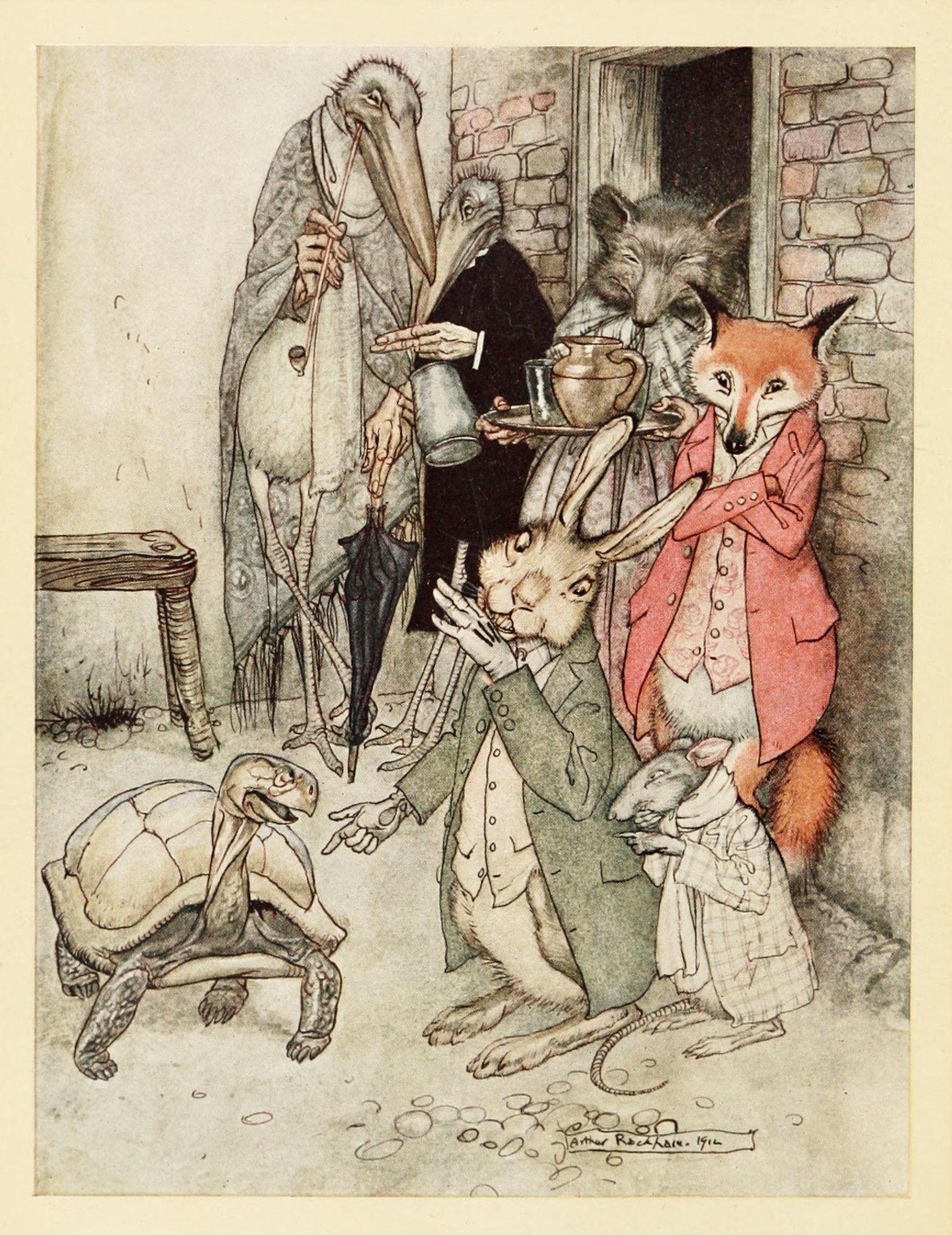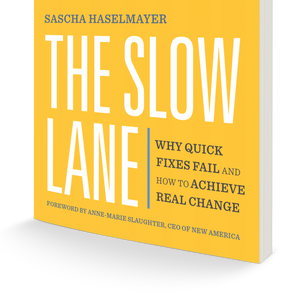People have known the perils of rushing to action for thousands of years. Philosophers, religions, and folktales caution us against rushing to action. Many warn us of the arrogance that comes with moving fast.
1/ The Fables (With Questionable Morals)
Aesop, the ancient Greek storyteller, created the fable of “The Tortoise and the Hare” that has inspired countless variations over time of a slow-mover (the tortoise) beating an arrogant sprinter (the hare). In Aesop’s telling, the over-confident hare takes a long nap during the race, letting the slow and steady tortoise arrive faster. The meaning here is ambiguous. Is it a warning against arrogance, or a celebration that perseverance and steadiness will prevail? In some variants of the story, it is trickery that prevails, as is the case in the Grimm's fairy tale “The Hare and the Hedgehog”, where the hedgehog places his similar-looking wife near the finishing line. The incredulous hare demands revenge-runs over and over, until he dies of exhaustion.
To me, these fables offer a familiar backdrop to our understanding of the Slow Lane. They frame slowness as a virtue, albeit with different values and at times questionable meanings. But most cultures have a variation of Lao Tzu's 2,600-year-old wisdom that “He who rushes ahead, doesn't go far”.

2/ Slow Food For Social And Ecological Justice
I, myself, am a relative late-comer to slowness, not paying all too much heed to these tales. But as I began to see the Slow Lane, it was Denisa Livingston, a friend and community health activist in Navajo Nation, who pointed me to the Slow Food movement. I had come across Slow Food when I was a teenager, passing a restaurant with a sign reading “No Fast Food here, just Slow Food!”. In my mind, I had filed it away as a snobby culinary alternative to fast food. But Denisa kindled my curiosity, and I began to read up on the Slow Food movement. In Carlo Petrini's “Food & Freedom” I learned how it had grown into a global community of hundreds of thousands of members promoting not just good food and wine, but clean food (meaning healthy to humans and the environment). And fair food, referring to the treatment of the people involved in the production and processing of food (for deeply disturbing insights into modern slavery in Italian agriculture, read “Are your tinned tomatoes picked by slave labour?”. Slow Food, I soon learned, is a Slow Lane movement in and of itself. Over 35 years, it evolved from a regional producers lobby in Italy into a global human, economic and environmental rights movement. The kind of movement that now is a useful platform even for indigenous rights activists like Denisa. And Slow Food is only the most recognizable among many movements that promote slowness in fields like medicine, cinema, cities (cittaslow), fashion, technology, and travel.
3/ Our Slow And Fast Brains
Daniel Kahneman’s best-selling 2011 book “Thinking, Fast and Slow” provides another compelling perspective. It allowed me to trace the Fast and Slow Lanes back to the dichotomy between two systems of thought built right into our brains: One system is fast, instinctive, and emotional; the other is slower, more deliberative, and more logical. Kahneman, a professor of psychology, explains many irrational actions in society, business, the economy and military by how little effort it takes us to act fast. Thinking slow, he demonstrates, takes a lot more effort and energy. And people tend to avoid it, whenever they can. This insight is so foundational, that it changed the field of economics forever. He proved that by thinking fast, people will not behave rationally in their own best interest. Just like the quick-fixers of the Fast Lane keep producing undesirable outcomes. It won him the Nobel Prize in 2002.
The Slow Lane Principles
In The Slow Lane, I have written about how social movements with very different missions have tailored what I call the five Slow Lane Principles to their specific needs: like parenting, data and technology, public service delivery, community development, healthcare, or waste management. They need to hold their urgency (#1), accepting the notion that even in moments of crisis they have to move at the speed of trust instead of rushing to action. They’re great listeners (#2), acting with humility that builds the kind of trust that opens hearts and minds to transformative new ideas. To do this, Slow Lane movements also share their agency (#3), meaning that they provide pathways for everyone, even the least prepared, to contribute and lead. And contrary to the common perception that inclusive movements are not agile or inventive, Slow Lane movements turn out to nurture curiosity (#4) to a very high degree, innovating by seeking inspiration from science, arts or other movements. This is how they retain the flexibility to adapt creatively to changing circumstances. Successful Slow Lane movements use technology as an enabler (#5), putting it at the service of their mission for social change, and have created a new playbook that withstands the dominance plays of the traditional tech startup playbook.
I found these principles in more than 100 movements. My guess is that the Slow Lane Principles are used so widely because they give groups the freedom to pursue whatever mission they have. They allow for diversity of thought and mission. They also create the kind of human dynamics we naturally enjoy, and let us change things without doing harm to others.
Slowness, practiced in this way, makes us more resilient in the face of countless challenges and tempting opportunities.



